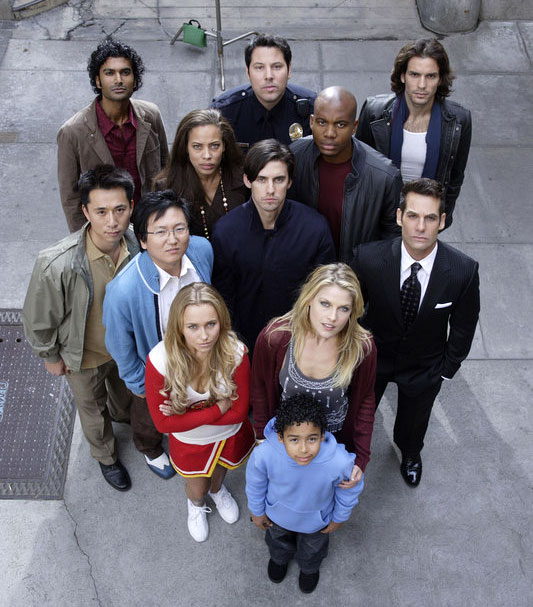Heroes attempted to turn comic books into television. It got the superpowers; it got the convoluted, incoherent plots; it got the (Marvel-era) whining and repetitive self-actualization. It’s got really hideous looking art for the comics-within-the-TV-show, courtesy of Tim Sale and Alex Maleev (both of whom have done decent work in other contexts — fulfilling another mainstream tradition of consistently coaxing horrible aesthetic performances from talented people.) It’s got the tedious snickering self-reference, epitomized by main character, Hiro, who announces with great fanfare “It’s Wednesday!” and then goes longbox diving to find secret clues to predicting the future (and if that sounds ridiculous, that’s only because it is). Heroes even channels some of mainstream comics dunderheaded, nerd-in-the-basement misogyny by making its two main female characters a cheerleader and a sex worker. “Save the fetish, save the demographic!”
But, despite all that, Heroes fails catastrophically to follow comicdom in one important respect. Traditionally, in comics, mutant genes, power rings, radioactive accidents, and tragic inspirational parental death are all apportioned out almost exclusively to (a) Americans, (b) people with white skin, or most often, (c) both a and b.
This works okay with comics since nobody reads them. But with television you run the risk of actually offending someone if you pretend the entire world is monochrome — which is why John Stewart gets to be Green Lantern on all the cartoons. It’s similar to the way in which businesses will trot out their one black executive (or secretary, if they’re that pitiful) for public encounters in a desperate effort to pretend that they’re not…well, what they are.
Heroes does better than tokenism, though. Its cast is thoroughly integrated in a way that mainstream comics have almost never been. Besides characters from Japan and India, the first season also featured a Hispanic-American hero, two African-American heroes, and an important African-American supporting character. The story is also notable for having multiple interracial romances — including that rarest of pop culture phenomena, an Asian-male/Caucasian-female pairing.
So is Heroes a glimpse of a possible comics future? A future in which DC doesn’t randomly insult entire continents full of people? One in which Marvel doesn’t say…”Hey! Black Panther! Storm! They’re both black! They should get married!” A future in which a black man under the Spidey mask doesn’t cause anyone to freak out even a little bit?
Maybe it is. But if Heroes is the future, there’s not much cause to celebrate. Because, while the show certainly has lots of minority characters, it treats those characters with systematic and concentrated stupidity. White characters are politicians and cheerleaders and single moms and cops; — “normal” people. Hispanic Isaac Mendez (Santiago Cabrera), on the other hand, is a junkie. African-American D. L. Hawkins (Leonard Roberts) is a criminal. Mohinder Suresh (Sendhil Ramamurthy), an Indian scientist, is drafted to spout pseudo-mystical gibberish at the beginning of each episode because Eastern peoples are all spiritual and shit. And, of course, the show’s black characters have a disturbing propensity for ending up dead.
Most depressing, though, is the handling of Hiro (Masi Oka). Presented as the moral center of the show, Hiro is less a person than a mismatched pile of Japanese stereotypes. He works at an oppressively homogeneous Japanese company lifted from paranoid 80s American nativist film; he gets a samurai sword and is taught to use it by his improbably adept father; he obsesses over pop culture like an uber-nerdy otaku. The fact that his English is not so great is used as an excuse to present him as an intellectual and emotional child who coins cutesy nicknames for other characters whenever he has the chance (“Flying Man”, “Evil Butterfly Man”). Just in case you missed the point, the writers actually regress Hiro’s brain to that of a 10-year-old for a while. But whether regressed or not, he and his pal Ando are treated throughout the series as the comic relief — goofy stunted Asians playing at being men.
To be fair, it’s not just minority characters in Heroes who are written poorly. White ethnics like the Irish are portrayed as tribal; the Italian Pettrellis are saddled with stereotypical crime connections and an unhealthy obsession with family. Mohindir has to endure a storyline where he becomes a mad scientist because nobody can figure out what else to do with a scientist besides making him mad. A big part of the problem with the show is simply that it’s crap. The scripts rely on stereotypes and clichés not out of any particular animus, but just because the people in charge are dumb and not especially creative.
Still, for comics folks, it can’t help but be a sobering spectacle. Heroes is embarrassingly bad in most ways. And yet, in its handling of minority characters, it’s significantly better than the vast majority of superhero comics. It’s hard to escape the conclusion that the mainstream needs to get much, much better before it can even be said to merely suck.

